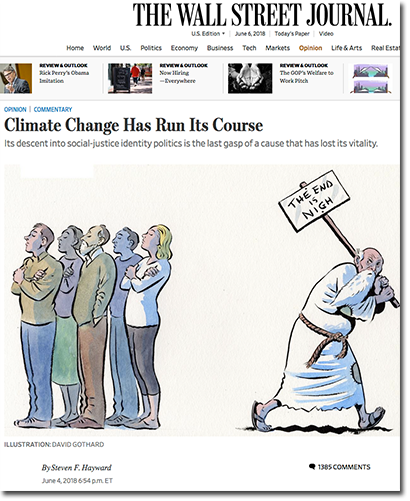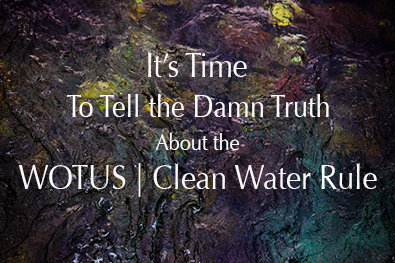 [Trigger warning: If you’ve had enough of politically oriented discourse this week, skip this read. Why post here on Chi Wulff? Simple, the industry (fly fishing) has embraced the notion of climate change fairly vocally, hence it’s a fair discussion point, and rarely does one read a frank discussion of the climate change movement from Berkeley of all places.
[Trigger warning: If you’ve had enough of politically oriented discourse this week, skip this read. Why post here on Chi Wulff? Simple, the industry (fly fishing) has embraced the notion of climate change fairly vocally, hence it’s a fair discussion point, and rarely does one read a frank discussion of the climate change movement from Berkeley of all places.
And before CC zealots attack here on Chi Wulff, note the article does not dispute the presence of a changing climate, and note my comments below.]
From the Wall Street Journal opinion page on the 4th, from the desk of Steven F. Hayward, senior resident scholar the Institute of Governmental Studies, UC Berkeley.
Read the full piece here; excerpts below –
Climate change is over. No, I’m not saying the climate will not change in the future, or that human influence on the climate is negligible. I mean simply that climate change is no longer a pre-eminent policy issue. All that remains is boilerplate rhetoric from the political class, frivolous nuisance lawsuits, and bureaucratic mandates on behalf of special-interest renewable-energy rent seekers.
Judged by deeds rather than words, most national governments are backing away from forced-marched decarbonization. You can date the arc of climate change as a policy priority from 1988, when highly publicized congressional hearings first elevated the issue, to 2018. President Trump’s ostentatious withdrawal from the Paris Agreement merely ratified a trend long becoming evident.
A good indicator of why climate change as an issue is over can be found early in the text of the Paris Agreement. The “nonbinding” pact declares that climate action must include concern for “gender equality, empowerment of women, and intergenerational equity” as well as “the importance for some of the concept of ‘climate justice.’ ” Another is Sarah Myhre’s address at the most recent meeting of the American Geophysical Union, in which she proclaimed that climate change cannot fully be addressed without also grappling with the misogyny and social injustice that have perpetuated the problem for decades.
The descent of climate change into the abyss of social-justice identity politics represents the last gasp of a cause that has lost its vitality. Climate alarm is like a car alarm—a blaring noise people are tuning out…
And perhaps the key reason I’ve posted today (the column’s conclusion, emphasis mine) –
…“In the final stage,” Mr. Downs concludes, “an issue that has been replaced at the center of public concern moves into a prolonged limbo—a twilight realm of lesser attention or spasmodic recurrences of interest.” Mr. Downs predicted correctly that environmental issues would suffer this decline, because solving such issues involves painful trade-offs that committed climate activists would rather not make.
A case in point is climate campaigners’ push for clean energy, whereas they write off nuclear power because it doesn’t fit their green utopian vision. A new study of climate-related philanthropy by Matthew Nisbet found that of the $556.7 million green-leaning foundations spent from 2011-15, “not a single grant supported work on promoting or reducing the cost of nuclear energy.” The major emphasis of green giving was “devoted to mobilizing public opinion and to opposing the fossil fuel industry.”
Scientists who are genuinely worried about the potential for catastrophic climate change ought to be the most outraged at how the left politicized the issue and how the international policy community narrowed the range of acceptable responses. Treating climate change as a planet-scale problem that could be solved only by an international regulatory scheme transformed the issue into a political creed for committed believers. Causes that live by politics, die by politics.
If the author is accurate, and to some degree the opinions espoused appear quite solid (polling data for example), the bastardization of the climate change package by those who have hijacked the (at times very legitimately challenged) science has squandered shamefully a genuine opportunity to invoke critically needed changes in how we nurture and care for the environment.
The clean energy options detailed above (italicized in the quote, related to nuclear generation) are a glaring example of the blatant hypocrisy which has critically damaged the climate change brand.
Naively, I remain optimistic that for example cleaner energy options are within reach, though there’s a lot of work to be done to get there.
Maybe Tom Sadler’s call to share a beer is a decent place to start.

